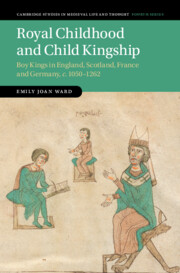Book contents
- Royal Childhood and Child Kingship
- Cambridge Studies in Medieval Life and Thought
- Royal Childhood and Child Kingship
- Copyright page
- Dedication
- Contents
- Figures
- Preface and Acknowledgements
- Abbreviations
- Genealogies
- Chapter 1 Royal Childhood and Child Kingship
- Part I Royal Childhood and Child Kingship: Models and History
- Part II Royal Childhood: Preparation for the Throne
- Part III Child Kingship: Guardianship and Royal Rule
- Chapter 7 Guardianship, Regency and Legality
- Chapter 8 Adapting and Collaborating
- Chapter 9 Feasting Princes?
- Chapter 10 Entering Adolescence
- Conclusion
- Bibliography
- Index
Chapter 7 - Guardianship, Regency and Legality
from Part III - Child Kingship: Guardianship and Royal Rule
Published online by Cambridge University Press: 04 August 2022
- Royal Childhood and Child Kingship
- Cambridge Studies in Medieval Life and Thought
- Royal Childhood and Child Kingship
- Copyright page
- Dedication
- Contents
- Figures
- Preface and Acknowledgements
- Abbreviations
- Genealogies
- Chapter 1 Royal Childhood and Child Kingship
- Part I Royal Childhood and Child Kingship: Models and History
- Part II Royal Childhood: Preparation for the Throne
- Part III Child Kingship: Guardianship and Royal Rule
- Chapter 7 Guardianship, Regency and Legality
- Chapter 8 Adapting and Collaborating
- Chapter 9 Feasting Princes?
- Chapter 10 Entering Adolescence
- Conclusion
- Bibliography
- Index
Summary
This reassessment of guardianship terminology interrogates how medieval writers described the administrative, governmental, tutorial and emotional responsibilities of a boy king’s guardians. Analysing the vocabulary used to describe child kingship in royal documents, letters, chronicles, annals and various other sources rapidly reveals the inadequacies of the terms ‘regent’ and ‘regency’ before the fourteenth century at the earliest. Those writing while a boy was king, or in the years immediately after, made a sharp distinction between the conception of royal rule, on the one hand, and the duties, actions and responsibilities of those supporting the child ruler, on the other. This chapter interrogates, in turn, how writers distinguished between the terminology of royal rule, government and administration, education and nurture, and legal wardship and protection. Although ideas concerning the guardianship of minors prominently influenced representations of child kingship, this was only one aspect of a much broader conception of a child’s rule and the protection they and their kingdom required.
- Type
- Chapter
- Information
- Royal Childhood and Child KingshipBoy Kings in England, Scotland, France and Germany, c. 1050–1262, pp. 171 - 200Publisher: Cambridge University PressPrint publication year: 2022

